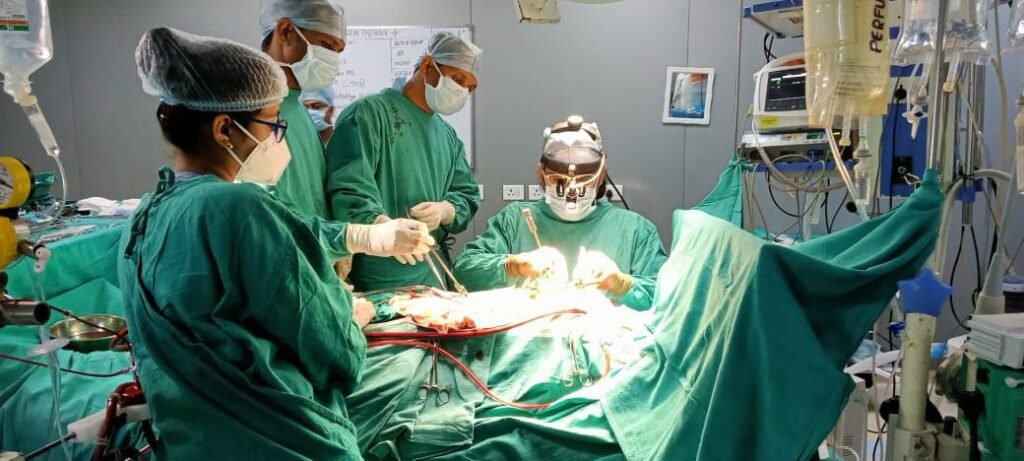Best Cardio vascular,
Surgeon In Jaipur
The department of Vascular surgery deals with diseases of the vascular system which includes the blood vessels- veins, arteries and lymphatic system. The highly skilled vascular and endovascular surgeons treat various types of blood vessel problems and lymphatic system conditions (vascular diseases) fully to restore the maximum health and well-being of all aged patients. The extensive experience and expertise, coupled with the team approach and research prowess enable the team to deliver successful treatment outcomes each time.

Best Cardiac Surgeon in Jaipur

Vascular diseases we treat include:-
- Acute blood clot
- Carotid endarterectomy
- Bypass surgery for peripheral artery disease and gangrene of the limbs
- Endovascular and open surgical treatment for peripheral artery aneurysms
- surgery for varicose veins and venous ulcers
- Endovascular and open surgical reconstruction for deep vein occlusions
- Hemodialysis access
- Treatment of vascular malformations.
- Endovascular or open repair of abdominal aortic aneurysms, thoracic aortic aneurysms, and thoracoabdominal aneurysms.
- Fenestrated and branched stent-grafts.
Diagnosis, treatment, and prevention of vascular diseases
Some of the ways in which vascular diseases are diagnosed include:
- A physical examination of the affected area.
- For peripheral artery disease, a comparison of blood pressure on the arms and ankles is done.
- Ultrasound scanning helps the doctor to check the blood vessels and observe if there are any blockages or other problems.
- Angiography is a common way of carrying out diagnosis of vascular diseases. Here, a dye is injected into the blood vessels. MRA or CTA scanning is then used to view the blood vessels and find out if blood flow is normal. An angiogram involves inserting a catheter into the blood vessel until it reaches the affected area and a dye is injected. This allows the doctor to diagnose and even treat the blockage through a technique known as balloon angioplasty where the blockage is removed and a stent may be inserted to prevent constriction of the blood vessel.
- Blood tests for cholesterol and triglyceride are used to help the surgeon understand the overall health of the patient.
- Tests may also be conducted on the heart, lungs, kidneys, and the digestive system since vascular diseases can affect the functioning of any of these organs.

we’re here to all your questions
Manipal Hospitals maintains its leadership position in cardiovascular medicine by providing high-quality patient care and the latest and best surgical options – including minimally invasive heart surgery.
What does vascular surgery involve?
Vascular surgery is a subspecialty that deals with diseases of the vascular system; this includes the arteries, veins, and lymphatic circulation. The diseases are managed by medical therapy and minimally invasive catheter procedures. Vascular surgery involves various techniques such as balloon angioplasty, stenting, graft placement, and vascular reconstruction.
How long does it take to recover from vascular surgery?
The recovery time for vascular surgery depends on the type of surgery you’re having and other factors as well. This is because some surgeries can be more intense and require 24 hours in intensive care, and the patient will have to recover in the hospital for ten days; if the patient experiences any complications during recovery, then the stay period will increase.
Are there any risks in vascular surgery?
Surgeries always involve an element of risk. This is more so in the case of vascular surgeries since the surgery is done on the blood vessels. Risks like bleeding, and stroke exist but in the hands of a competent vascular surgeon, these risks can be minimized. The risks are more for those who smoke, have high blood pressure, or any lung and kidney diseases.
